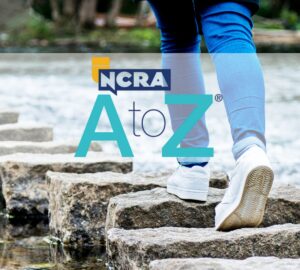By David Ward
You can certainly still make a good and interesting living as a court reporter with basic professional reporter certification and skills. But increasingly reporters who have added additional certification say the time and effort putting into getting them is well worth it for their career.
This is especially true of reporters who have obtained the NCRA’s Certified Realtime Reporter certification, which means achieving 96 percent accuracy in a two-voice question-and-answer skills test at 200 words per minute.
For some reporters, being able to say they are CRRs helps them better market themselves in what in some areas remains a very competitive business. Others cite the desire to be everything they can be in the careers as the primary reason they went for realtime certification.
But for the vast majority of those with CRR certification, the primary benefits of being a realtime reporter are financial.
The primary benefit
“It really does boost my income,” says Sue Terry, RPR, CRR, of Springfield, Ohio, and a member of NCRA’s Board of Directors. “I do a lot of travel for my job but can’t really justify that expense unless they are premium jobs — and all premium work is realtime hookup, daily draft, or expedited copy.”
Sandy Bunch Vanderpol, RMR, CRR, who works in the Sacramento, Calif., agrees: “I’m already writing realtime to my computer, and with a little more skill and some new equipment, I can boost my income by 25 percent, if not more.”
It’s hard to find any part of the country — or the globe — where realtime is not a significant income generator. Micheal Johnson, RMR, CRR, of Cedar Park, Texas, travels not just across the United States but around the world doing depositions. “Realtime jobs mean you get paid more per page and that’s where every reporter wants to be. And when you write better, it cuts down on editing, which means you can take on more jobs,” says Johnson.
Most attorneys are generally familiar with realtime by now, but that doesn’t mean they all understand why it’s beneficial to their work and, more importantly, why it’s worth the extra money.
That’s where new technology is making a difference, especially the growing use of tablets like the Apple iPad in depositions and arbitrations. “There is just such a cool factor in throwing out an iPad at a deposition and offering realtime — that gets them 90 percent of the time,” says Johnson.
Education of clients is key
The vast majority of the jobs she does are already booked as realtime, says Lisa Knight, RPR, RMR, CRR, of Littleton, Colo. But she stresses that even the few that start off as traditional reporting jobs can be turned in to realtime work with the right approach — and a few iPads.
“I went to a case in Denver where initially the attorneys didn’t want realtime, but I let them have the iPad for the first hour and a half for free just to look at,” she says. “This was a two-week arbitration and by the end of the second day, one attorney was like ‘I’ve got to have that iPad back,’ — because the judge was using it and he knew the judge was reviewing testimony on his own iPad. And because one counsel wanted it, the other decided they had to have it, too, which was great because I ended up making twice as much money on that job. It wasn’t booked as a realtime job, but by giving them a teaser I was able to upsell both sides.”
Some of this marketing and attorney education work can and should be done by firms that end up booking the job for the reporter. But Terry says reporters need to take on more of that realtime sales job themselves.
“When I do seminars for reporters, I always advise them that they are the ones who are out there on the firing line with the attorney and can do a better job than the firm in trying to sell this as an additional service to a paralegal over the phone,” Terry says.
Terry adds it’s not enough just to give an attorney an iPad. “I have a small card printed out that has basic commands on it,” she says. “The command card ends up silently educating the attorney and judges — many of whom had been getting realtime for years but who had no idea you could do all that with it.”
Knight notes that you can easily get a license from your reporting software vendor to allow the output of realtime to several iPads — suggesting that small once-a-year fee can mean a lot more money to your business. “Every time you hand someone an iPad, it’s ‘Ka-ching,’ ‘Ka-ching,’ ‘Ka-ching,’” she says.
Rough drafts can help too
Even if the attorneys opt out of iPads and realtime hookups, CRR reporters can still generate additional income by providing draft transcripts at the end of day’s deposition work.
“Draft transcripts is a huge deal in this part of the country because a lot of lawyers are technology phobic and consequently are not interested in realtime hookups,” says freelance reporter Ed Varallo, RMR, CRR, of Worchester, Mass.
Varallo notes he’s been offering realtime hookups for 15 years but says demand for the service has changed little during that time. “The reason is the lawyers who like it, like it, and they’ll keep ordering it,” he says. “And the lawyers who think it’s a distraction say exactly that.”
For realtime reporters, often it’s the type of case that dictates whether they will get their additional fees from a realtime hookup via iPad or a draft transcript at the end of the day’s testimony — or both.
“The people who use the realtime hookups tend to be doing more technical cases,” Varallo says. “They may have an expert testifying on something who may be giving a fairly long answer and they want to see exactly what he or she said.”
That’s different from more routine litigation such as personal injury, employee disputes, age discrimination, construction contract issues and other cases where the testimony is likely not that technical.
“In those situations the attorneys are more confident, so to speak,” Varallo explains. “They’re comfortable with the topic but at the end of it, there’s been a lot of pages of testimony and they want to know how things were said — but they don’t want to have to study it as it’s going on.”
Varallo offers a seminar for court reporters, “Creating demand for draft transcripts,” that stresses that many lawyers don’t know what a good a draft transcript is until the reporter shows them.
“You have to give them a loss leader and send it the first time,” he says, adding that in many ways generating interest for daily draft transcripts today is much like the work reporters did decades ago to build up demand for mini-transcripts.
“That was before email and what we did was go print mini-transcript out and say, ‘I can print this out on four sides and the font is great’ and the lawyers loved it,” Varallo explains. “But they didn’t come to us; we got the product and went to them, creating the demand.”
Because of the increased income potential, Johnson says he pushes rough draft sales at almost every job. “For me, there has been an increase of rough drafts in the past five years,” he says. “Again, it’s one of those things that doesn’t take a lot of my time because I try to write each job the best I can and as clean as I go — and I use my break times efficiently and do minor edits/globals.”
Realtime saves the reporter time too
Because his writing is so accurate, Johnson is able to sell the fact that he can get the draft to the attorneys quickly. “Many times when asked how long it will take to get the rough out, my response has been, ‘Before you make it out of the parking garage,’ or ‘Before you get to the airport,’” he says.
Knight adds it also helps to explain how draft transcripts can end up being overall money-savers for the legal team. “I tell them it’s only $200 more, and it can help your expert prepare for the next day’s testimony,” she says. “I actually point out that I’m saving them money in their billing time by getting them the rough draft.”
That message seems to resonate even in this fiscally tight legal environment. For instance, VanderPol noted a definite increase in realtime drafts in recent years. “Not all cases or attorneys are using realtime hookups, but most are definitely ordering the rough or first draft emailed to them after the deposition,” she says,
While the primary benefit is financial, VanderPol and others note that realtime depositions can also be a major time-saver. “I may be working harder during the deposition, but it is well worth it,” Vanderpol explains. “I’d rather have the witness available to ask for spellings while reporting realtime than try to do a search for the current spelling when editing the transcript later.”
“I probably spend less time editing and preparing the final so I actually spend less time on the job because I write realtime,” says Knight.
But on a few occasions, the perfectionist nature of the realtime reporter that can get in the way of additional income.
Some CRR certified reporters take such pride their work that they are loathe to let an attorney see any mistake just sitting on an iPad screen, figuring it may be 45 minutes or longer before they can clean it up.
But Terry points out most modern reporting software make it far easier to clean up those small mistakes and get errors out of the realtime feed during even a shortest of lulls in testimony.
“StenoCAT, for example, allows you to split the screen so you can edit on one part of the screen while keeping your place on the other part of the screen,” Terry explains. “When you learn to do that, your drafts are basically done at the end of the day.”
Realtime in non-legal situations
For those who still need additional convincing that a CRR certification can boost their reporting careers in many different ways, there’s also an interesting trend in the United States and elsewhere where realtime is increasingly being used in non-legal situations such as broadcast captioning or providing live text feeds at conventions, financial conferences, or press events.
“In my opinion, there’s more of a demand for realtime skills in non-legal settings than ever before,” notes Allison Kimmel, RDR, CRR, CBC, CCP, of Columbus, Ohio, and past president of the Ohio Court Reporters Association. “It is not necessarily tied to transcription or pages. It is more the availability of instantaneous readable text and your ability to provide it.”
Kimmel currently works as a captioner in Ohio and is an employee rather than a freelancer. But she stresses that anyone on the legal side of the business with realtime skills should be able to drum up interest for her services in non-legal situations by soliciting companies and events in their area.
“I think that having the CRR certification opens doors for a court reporter interested in branching out into captioning and CART,” she adds. “I don’t feel it is necessarily a requirement, but it certainly doesn’t hurt you to have that certification under your belt. My best advice is if you’re interested in getting away from legal work is take a seminar on CART and captioning to fine-tune your skill set.”
Though she primarily does depositions and other legal proceedings, Terry has also on occasion worked at conventions, providing, for example, realtime text for the hearing impaired during the keynote speech.
“My feeling, is the reason we don’t see it a lot in other settings is because no one is promoting it that effectively yet,” she says.
Whether it’s CART and captioning, providing live transcripts of conference calls or conventions or doing traditional deposition and arbitration work, realtime is already boosting the income of CRR certified reporters — and has the potential to be even more lucrative once those with the skill learn to market it more aggressively and effectively.
“They will turn you down, but it always helps to ask,” says Knight. “I work as an independent contractor for many firms, but for me it’s about keeping focused the business side of things and realtime makes a big difference them.”
David Ward is a freelance journalist in Ramona, Calif.













